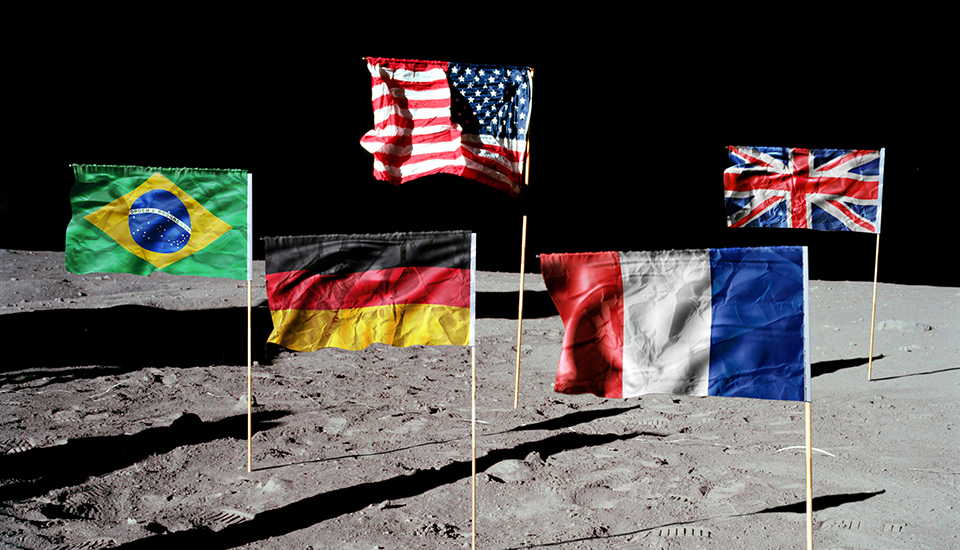Tackling the final frontier
Growing up in the late 1960s, space exploration filled my imagination with awe and wonder. I spent endless hours watching The Jetsons, Lost in Space, Star Trek and the Apollo missions and always thought that, by now, space travel would be commonplace. While my childhood dreams of becoming an astronaut faded as I entered adulthood, it is time to get excited about the cosmos again.
Around the globe, governments and corporations are revving up the space economy: 72 countries claim active space programmes and over a dozen have launch capabilities. While the US has been the perceived leader in the field, China’s space programme – along with the country’s growing economic strength – has been advancing. India, too, wants in on the action, along with thousands of private-sector companies and universities.
Why the rush to space? Many believe that building infrastructure in space will shape many, if not all, industries on Earth – energy, communications, finance and insurance, and transportation, among others – with incalculable socioeconomic benefits.

Resources certainly will be key. One can imagine a great race to establish lunar mining camps for valuable rare metals needed in batteries, electronic gadgets and sophisticated military equipment. Since China has a near monopoly on production of these on Earth, there is geopolitical interest from many countries wanting to source them from the Moon, thereby reducing their dependence on one country.
Moreover, scientists claim that lunar ice can be converted into hydrogen and oxygen to create rocket fuel, which is crucial for deeper space missions. For any country interested in exploration beyond the Moon, this opens up a huge opportunity. Scientists estimate that asteroids in outer space could contain more valuable metals – such as platinum, iron, nickel and cobalt – than has been mined in Earth’s history. The 140-mile-diameter asteroid between Mars and Jupiter called 16 Psyche purportedly contains enough nickel ore to supply current human demand for millions of years.
Space may also be part of the solution to global warming. Current renewable energy can only be harnessed when the wind is blowing, or the sun is shining, but we need electricity around the clock, every day, and storage is expensive. Space offers an elegant answer: solar power stations orbiting and facing the Sun 24/7, wirelessly transmitting the energy to Earth via microwaves or lasers. While technologies still need to be invented for this to become economically viable, efforts are under way. China has already announced plans to deploy space-based solar power stations by 2035. The possibility of cheap, clean, endless energy alone is reason to forge into space.
Wall Street is certainly excited by the potential of space and lots of capital will be needed to accelerate the industry’s expansion. In the past, space was largely the domain of governments, but a new arena of commercial operators such as Elon Musk’s SpaceX, Jeff Bezos’s Blue Origin and Richard Branson’s Virgin Galactic travel effort now operate alongside the public sector. NASA has even awarded substantial contracts to SpaceX and Boeing to kickstart the Commercial Crew Program, giving $4.2bn to Boeing and $2.6bn to SpaceX. To this point, only SpaceX has met NASA’s certification requirements. In 2020, Morgan Stanley estimated that global space activity could generate $1trn annually in 2040, up from $350bn today. Sensing this potential, both the US Bureau of Economic Analysis and the OECD have already begun significant efforts to measure the global space economy.
Some of the near-term profitable opportunities may not sound as alluring as lunar power plants or exploring the galaxy. In fact, the most likely business opportunities will be launching more satellites to provide greater broadband internet access. More satellites will drive down data costs, just as data demand explodes from autonomous cars, the internet of things, artificial intelligence, virtual reality and ubiquitous video. With more satellites, the per-megabyte cost of wireless data potentially can fall to less than 1% of today’s levels. This is how space helps reshape our Earthbound economy.
Governance will be needed to referee commercial and military space activity. Historically, space mining was considered to be prohibited by Article II of the 1967 United Nations (UN) Outer Space Treaty (OST). Even though this helped avoid a Cold War militarisation of space, with over 100 countries ratifying the treaty, since then broad cooperative space accords have largely failed. The ill-fated 1979 Moon Agreement – a treaty to govern private commercial space claims under the UN’s purview – has been ratified only by 19 countries, none of which even have space travel capabilities.
The need for governance is heating up. In 2015, the Obama administration granted Americans the right to own any materials they extract in space, blowing open the door for civilian space business. In 2018, China launched a reconnaissance rover on the Moon’s far side that has been gathering samples and data for two years. In late 2019, President Trump announced the formation of a US Space Force under military control. And in October 2020, the US led the signing of the Artemis Accords, a set of bilateral agreements on space between America and its allies Australia, Canada, Italy, Japan, Luxembourg, the United Arab Emirates and the UK, purposefully skirting the UN. This pact claims to affirm the 1967 OST, but critics note it actually expands the interpretation of commercial space law by specifically stating that “the extraction of space resources does not inherently constitute national appropriation under Article II” of the treaty.
Still, the intention behind the Artemis Accords is not to establish new regulations for all activities in space, but those that fall under NASA’s Artemis programme, the next phase in lunar exploration. Artemis’s main goals include landing the first woman on the Moon by 2024 and constructing a lunar base (known as The Gateway) that will serve as a long-term base for lunar exploration and aid in future travels to further destinations, such as Mars.
As one can imagine, a future space economy could be the most exciting human endeavour ever; but it will not be without complications. Current agreements like the Artemis Accords may be viewed more as small, cliquish club rulebooks than a true multilateral agreement. At least, that is how Russia sees it; its absence from the Artemis Accords reveals a shift in how the country views the relationship between its own space agency and NASA.
Of course, there is an important distinction between NATO and the Artemis project: one is a military alliance, and the other is a scientific one. Still, Russia is turning to other potential partners, those with more closely aligned governmental philosophies, for future space missions.
Recently, Russia and China signed an agreement to collaborate on a lunar base (a primary goal of Artemis), which could be the defining move that ends years of US and Russian cooperation in space. China, too, believes Artemis is a US political effort instead of a scientific one and state daily Global Times praised the agreement with Russia as a way to “promote balance and fairness with strength and real actions”.
As we have seen down on Earth, a lack of international standards often leads to a chaotic, competitive race to the bottom. Unregulated space activity could create myriad problems from accidental (or intentional) blocked data transmission to orbital ‘pollution’ of too many objects. Indeed, just a few uncontrolled collisions could generate enough debris to render near-Earth space unusable. Some observers also worry that the recent Wall Street mania over space companies may create players who launch orbitals but eventually go bust, leaving more potential for collisions and other dangers. In April 2021, a presentation at the European Conference on Space Debris highlighted that this “space junk” problem may be underestimated and could, in a worst-case scenario, increase 50 times by 2100.
And, of course, no one wants to see space militarised with escalating arms races.
To borrow an overused phrase from Star Trek, space is the final frontier. The technological, economic and governance efforts for building the new space economy – like other historic transformations – tend to be a series of quiet evolutions that, in total over time, become a revolution. Fasten your seatbelts. Judging by recent developments, the period that future historians will call the Space Revolution is just taking off.
Peter Marber FRSA has published seven books, teaches at Harvard and Johns Hopkins, and is a Fellow at the Royal Astronomical Society.
This article first appeared in the RSA Journal Issue 3 2021

Become an RSA Fellow
The RSA Fellowship is a unique global network of changemakers enabling people, places and the planet to flourish. We invite you to be part of this change.
Related articles
-
Earth Day: why it needs to be every day
Comment
Phillip Ward
This year’s Earth Day focuses on plastic pollution. It’s a massive problem that must be addressed, but we need to go beyond one-day initiatives to instil a sense of urgency in responding to all the issues we face.
-
Making the most of your late career
Comment
Ann Thorpe
How do you harness your potential in the last chapter of your career? Ann Thorpe explains how the Late Career Alliance could help to craft your career narrative, impact and legacy.
-




Be the first to write a comment
Comments
Please login to post a comment or reply
Don't have an account? Click here to register.